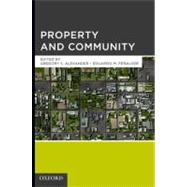
Note: Supplemental materials are not guaranteed with Rental or Used book purchases.
Purchase Benefits
What is included with this book?
| Acknowledgments | p. xi |
| Contributors | p. xii |
| Introduction | p. xvii |
| The Objects of Virtue | p. 1 |
| Introduction | p. 1 |
| Aristotle on "Private in Possession, Common in Use" | p. 5 |
| Property in the Politics | p. 8 |
| Property in Ethics | p. 15 |
| Conclusion on Aristotle | p. 21 |
| Aquinas on Private Property | p. 22 |
| Thomas Aquinas on Property and Its Purposes | p. 24 |
| Conclusion on Aquinas | p. 33 |
| Back to the Future | p. 34 |
| Reimagining Takings Law | p. 39 |
| Introduction | p. 39 |
| Avoiding the Extremes | p. 40 |
| Against Strict Full Compensation | p. 40 |
| Against No (or Almost No) Compensation | p. 43 |
| Rethinking Takings | p. 47 |
| Foundations | p. 48 |
| The Nature of the Resource | p. 49 |
| The Social Context | p. 50 |
| Technique | p. 51 |
| Concluding Remarks | p. 55 |
| How Property Norms Construct the Externalities of Ownership | p. 57 |
| Introduction | p. 57 |
| Externalities, Harms, and Norms | p. 61 |
| A Brief Intellectual History of Externalities | p. 66 |
| How Norms Construct Ownership | p. 70 |
| How Norms Construct Externalities | p. 74 |
| Conclusions | p. 78 |
| Property and Marginality | p. 81 |
| Introduction | p. 81 |
| Holmes and Decentering in Legal Thinking | p. 85 |
| Noticing the Margins | p. 91 |
| Exploring the Margins | p. 97 |
| Conclusions | p. 100 |
| Facts on the Ground | p. 107 |
| Commons and Legality | p. 141 |
| Introduction | p. 141 |
| Contextualizing the Commons | p. 142 |
| The Turn Towards Contextualization in Commons' Analysis | p. 142 |
| The Economically-Oriented Perspective | p. 142 |
| The Institutional Economic Approach | p. 144 |
| A Dynamic Contextualized Analysis of Commons | p. 146 |
| Commons and Legality | p. 149 |
| Legality and the Theory of Commons | p. 149 |
| Imposition of Law | p. 150 |
| The Autonomy of the Commons | p. 152 |
| Commons and Legal Environments | p. 153 |
| The Dynamic Analysis of Legality and Commons | p. 154 |
| Legality in the Kibbutz | p. 157 |
| Looking at the Past | p. 158 |
| Looking at the Present | p. 161 |
| Conclusions | p. 163 |
| Property in a Queue | p. 165 |
| Introduction | p. 165 |
| The Queue as a Medium of Power and Control | p. 166 |
| The Normative Merits of the Queue | p. 168 |
| The Basic Principles of the Queue | p. 169 |
| Time and the Normative Code of the Queue | p. 170 |
| Proprietary Connotations of the Queue | p. 172 |
| Priority of Arrival | p. 173 |
| Persistence of Presence | p. 174 |
| The Property of the Queuer | p. 175 |
| Semantic and Cultural Connotations of the Queue | p. 176 |
| Proprietary Behavior within the Queue | p. 179 |
| Reserving Places | p. 180 |
| Trading Places | p. 181 |
| Taking Places | p. 185 |
| Conclusions | p. 188 |
| Index | p. 197 |
| Table of Contents provided by Ingram. All Rights Reserved. |
The New copy of this book will include any supplemental materials advertised. Please check the title of the book to determine if it should include any access cards, study guides, lab manuals, CDs, etc.
The Used, Rental and eBook copies of this book are not guaranteed to include any supplemental materials. Typically, only the book itself is included. This is true even if the title states it includes any access cards, study guides, lab manuals, CDs, etc.